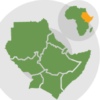This month, the UN Commission on Human Rights in South Sudan rang the alarm bell, warning that the country is on the brink of catastrophe, and sharing reports of ethnic cleansing and further mass atrocities. Today, however, few human rights defenders (HRDs) remain to tell the world about the violence underway and bring much needed scrutiny to the conflict.
Since the war broke out 3 years ago, and particularly since the outbreak of fighting in July this year, the situation of HRDs has dramatically deteriorated due to increased intimidation, threats, coercion, physical attacks and arrests. Since July 2016, DefendDefenders has documented dozens of cases of HRDs and journalists that have been forced to leave the country due to threats to their lives, and many others remaining have had to restrict their activities.
Edmund Yakani, the Executive Director of the Community Empowerment for Progress Organisation (CEPO) and one of the most outspoken HRDs in South Sudan, speaks here on the current situation, and shares his recommendations ahead of the December 9 meeting of the Intergovernmental Authority on Development (IGAD).
What is the current situation in South Sudan?
The situation in South Sudan is rapidly getting out of control. We have seen renewed confrontation between government and opposition forces, and mass atrocities are being committed in several parts of the country, including the Equatorias and Unity State. Former Central and Western Equatoria states are almost at a stage of full, intensive confrontation. Both government and opposition forces have committed shocking and widespread human rights violations. Right now, the lack of scrutiny, rising food insecurity, escalating tensions on all sides, and the upcoming dry season offensive make me fear that if nothing is done, we are going to see further atrocities and loss of life take place on a massive scale very soon.
Why is so little information available on these developments?
Access to information for the media and human rights defenders is very limited. Over 70% of HRDs have left since July 2016, and media houses and journalists have been repeatedly targeted through intimidation, newspaper shutdowns, arrests and torture. Two journalists have been killed since the July outbreak in fighting in Juba. This week an U.S. journalist was deported. Even the Ceasefire and Transitional Security Arrangement Monitoring Mechanism (CTSAMM), a body set up by the Joint Monitoring and Evaluation Commission, has very limited access. Monitoring and verification teams are denied access to places where atrocities are being committed. In fact, all reliable sources of information are being denied access.
What has been IGAD’s response to the conflict so far and what do you expect from Friday’s meeting?
Today, I appeal to South Sudan’s neighbours and IGAD to push for more coordination between international and regional mechanisms, and for Nicholas Haysom, the United Nations Special Envoy on Sudan and South Sudan, and Alpha Oumar Konare, the African Union High Representative for South Sudan, to come up with a coordinated strategy on how to address the conflict, protect hundreds of thousands of innocent civilians at risk, and bring about accountability and justice for the crimes committed since 2013.
IGAD’s response has been weak and inadequate. There has been division among IGAD members on how to address the situation. A holistic approach pushing for an all-inclusive political process is needed in this upcoming meeting, and members should pledge to ensure that warring parties will recommit to the 2015 Peace Agreement. They need to add their voices to the call for full implementation of Chapter V of the Peace Agreement, which established a Hybrid Court, and call on Juba to respond to the African Union’s reminder on the establishment of the Court.

